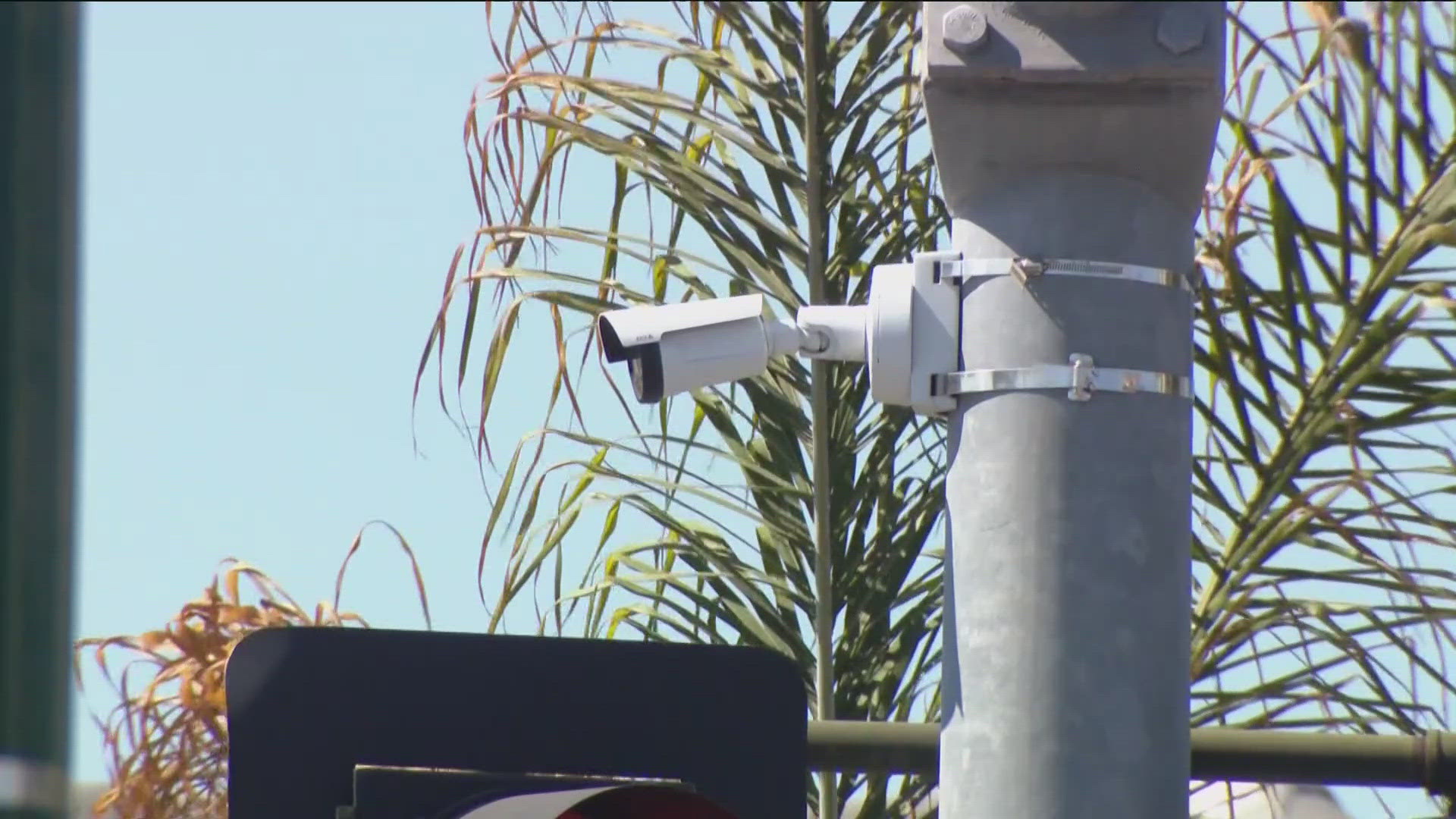SAN DIEGO — The San Diego Police Department will approach a City Council committee Wednesday in hopes of moving some of the planned 500 "Smart Streetlights" and paired license plate readers, claiming insufficient infrastructure makes them less impactful.
At Wednesday's Public Safety Committee meeting, SDPD will argue that infrastructure issues such as power problems or objects blocking the camera view prevented installations of the technology at 42 locations. The department seeks to redeploy the cameras in "zones" instead of prior approved fixed locations.
"During the installation process, SDPD discovered significant infrastructural issues that made installation at the proposed sites unfeasible," a city report on the issue reads. "Additionally, changing conditions, crime statistics, or community concerns may necessitate movement of the technology."
According to SDPD, at least 92 stolen vehicles, five firearms, and an estimated total of $1,209,700 worth of property have been recovered as a direct result of ALPR alerts since they began to be installed in December.
What the police are asking Wednesday is for committee approval to expand from a fixed location to a "two-block zone to ensure flexibility when infrastructure issues arise." The zones expand two blocks in each cardinal direction from the proposed placement.
The zones proposed include in high-traffic areas such as Pacific Beach, Mission Beach and Mission Valley, but also in areas with high proportions of minorities, such as Convoy, San Ysidro, City Heights, Logan Heights and Southeast San Diego.
According to the police, cameras will still not be allowed to monitor immigration buildings, reproductive centers such as Planned Parenthood, or places of worship, in accordance with the Transparent and Responsible Use of Surveillance Technology Ordinance signed into law last year.
The City Council committee presentation comes just two days after SDPD announced more than a dozen Smart Streetlights will be installed in Hillcrest ahead of this month's San Diego Pride Parade and Pride Festival, with police saying the cameras are a safety measure amid a rise in hate crimes in the city.
But privacy advocates argue police are raising the specter of anti- LGBTQ crimes to justify expanding the use of surveillance technology.
San Diego police say the cameras, which will be paired with automated license plate recognition technology, will be deployed at 14 locations in Hillcrest.
In a statement announcing the camera installations, the department said there was a 73% increase in hate crimes last year and highlighted recent potentially hate-related attacks at four Hillcrest businesses in which victims were shot with a pellet gun by suspects in a vehicle.
"Smart Streetlight and ALPR technologies are invaluable tools for our ability to investigate crimes throughout San Diego," San Diego Police Chief Scott Wahl said. "With the rise in hate crimes and our upcoming annual Pride parade and festival, we want to leverage this technology to protect our LGBTQ community. I'm proud to have several community leaders working with us to combat hate and hold criminals accountable."
According to SDPD, the cameras will be installed "immediately this week" following notification to the San Diego City Council and the recently established Privacy Advisory Board.
Privacy advocates say police are circumventing the typical approval process for new technologies by invoking the "exigent circumstances" section of the TRUST Ordinance.
"Exigent circumstances" refers to "an emergency involving danger of death or serious physical injury to any individual, or imminent danger of significant property damage, that requires the use of surveillance technology, as determined by city staff acting in good faith upon known facts," the ordinance reads.
In a statement, community groups TRUST SD Coalition and Activist San Diego said the annual Pride event doesn't constitute an exigent circumstance and said "police lack justification to claim that this recurring event is an emergency that justifies an unauthorized expansion of surveillance streetlights."
The statement continued, "The only conclusion we can draw from this legal move by SDPD is that gay life in Hillcrest is itself an ongoing exigent circumstance -- a form of life that requires surveillance without end."
The use of Smart Streetlights in San Diego has sparked debate after what was initially billed as a traffic management tool was later publicly revealed to involve camera technology utilized by police.
The camera network was shut down amid the ensuing uproar, but was revived last year with City Council approval.
If the zone development is approved Wednesday, it will still need to come before the full City Council.

